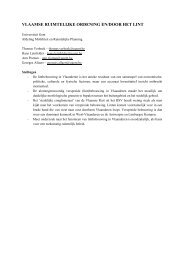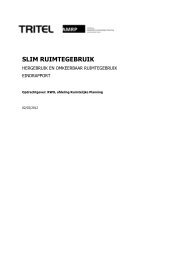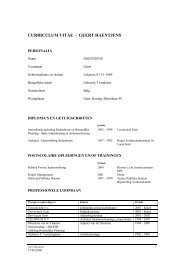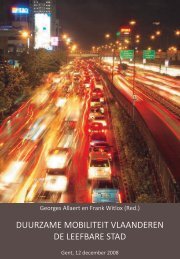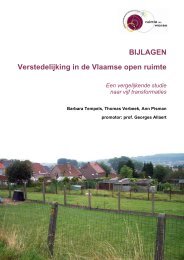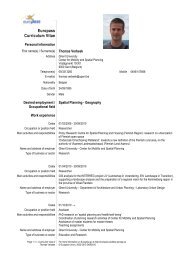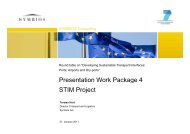RailNewcastle ERASMUS INTENSIVE RAILWAY PROGRAMME IN ...
RailNewcastle ERASMUS INTENSIVE RAILWAY PROGRAMME IN ...
RailNewcastle ERASMUS INTENSIVE RAILWAY PROGRAMME IN ...
Create successful ePaper yourself
Turn your PDF publications into a flip-book with our unique Google optimized e-Paper software.
Ghent University offers high-quality, research-based education in a wide range of academic<br />
disciplines, spread over 11 faculties. It attracts 30,000 students, with a foreign<br />
student population of 1,100 EU citizens and some 1,000 students from non-EU countries.<br />
It appoints about 4900 scientific staff members. The university provides training opportunities<br />
to young researchers through its five Doctoral Schools and awards around 400 Ph.D.<br />
degrees per year, of which over 20% go to international young researchers. The Civil<br />
Engineering Department (EA15) consists out of 6 research units where one of them is the Research Unit Mobility<br />
and Spatial Planning (AMRP). Sustainable mobility is one the main fields of AMRP’s research activity. Publications<br />
in national and international scientific magazines, regular courses, Master thesis, PhDs,<br />
lectures, seminars, congresses have been dedicated to it. AMRP provides education on the<br />
master level focussing on: planning theory, regional design, mobility and spatial infrastructure<br />
design, spatial management and spatial governance.<br />
Universiteit Gent – Afdeling Mobiliteit en Ruimtelijke Planning (AMRP)<br />
University Principal Point of Contact:<br />
Vrijdagmarkt 10/301, B-9000 Gent<br />
Phone: (+32 9) 3313251 - 3313255<br />
Fax: (+32 9) 3313269<br />
Email: giuseppe.pace@ugent.be<br />
Web page: www.planning.ugent.be<br />
Local programme coordinator:<br />
Georges Allaert,. Prof., AMRP Director, Universiteit Gent, Gent,<br />
Belgium<br />
Phone: (+32 9) 3313250-3313251<br />
Email: georges.allaert@ugent.be<br />
Yıldız Technical University (YTU), founded in 1911, is one of the leading higher state education<br />
institutions in Turkey with over 20.000 students enrolled in a vocational school, ten<br />
faculties, and two post graduate institutes situated in three campuses. Research and education<br />
in various disciplines of natural and social sciences, engineering, architecture and, art<br />
and design are conducted. Undergraduate educations are provided throughout the year in<br />
fall, spring and summer terms in daytime programmes, and evening programmes in some<br />
departments. With a bilateral agreement between YTU and any other foreign<br />
institute of higher education, student exchange for a maximum of two semesters is possible<br />
between these two institutions subject to the approval of authorized committees.<br />
University Principal Point of Contact:<br />
Yıldız Campus 34349 Beşiktaş / İstanbul,<br />
Turkey<br />
Phone: +90 (212) 383 32 08 (International<br />
Office)<br />
Fax: +90 (212) 227 69 90<br />
Web page: www.yildiz.edu.tr<br />
Email: intoffice@yildiz.edu.tr<br />
Yıldız Technical University<br />
Local programme coordinator:<br />
İsmail Şahin, Assoc. Prof., PhD: Yıldız Technical University,<br />
Davutpasa Campus, Department of Civil Engineering, Transportation<br />
Division, İstanbul, Turkey<br />
Phone: +90 (212) 383 51 80<br />
Personal URL: www.yildiz.edu.tr/~sahin/<br />
Email: sahin@yildiz.edu.tr<br />
12<br />
THE AIM OF THE <strong>PROGRAMME</strong><br />
The specific objectives of the three week intensive programme are:<br />
♦To encourage efficient and multinational teaching, training, learning and research<br />
exchange in the field of railway and logistics which will contribute to a more consistent<br />
education in European universities;<br />
♦To enable lecturers, students and researchers to work more closely on railway and<br />
logistics problems within multinational groups which will help to gain new perspectives on<br />
the topics discussed;<br />
♦To allow lecturers and trainees to exchange views on teaching, training and learning<br />
contents and to test teaching approaches in an international classroom environment;<br />
♦To foster the mobility of students, researchers, and faculty;<br />
♦To develop a variety of educational and research materials which could be used in<br />
the production of the programme and in future research in the area of railway and logistics;<br />
♦To collect teaching materials on various aspects of rail and logistics systems to be<br />
used not only for lecturing but also to further knowledge and experience sharing with external<br />
institutions wishing to collaborate with the programme’s teaching staff;<br />
♦To encourage a multi-disciplinary understanding of a complex system involving engineering,<br />
managerial, economic issues, etc;<br />
♦To collect a set of articles to promote the intensive programme and similar activities;<br />
♦To examine future possibilities for multinational master’s and PhD study and research<br />
programmes.<br />
<strong>PROGRAMME</strong> STRUCTURE<br />
The intensive programme <strong>RailNewcastle</strong> will use an innovative multidisciplinary blended<br />
learning approach that combines a number of learning and training methods, such as:<br />
lectures, project-based learning, web conferences, thematic seminars and technical visits.<br />
The methodological approach employed by <strong>RailNewcastle</strong> will be a combination of dynamic<br />
teaching schemes by lectures and a strict fixed schedule of activities for students<br />
and teaching team.<br />
During the first week within each thematic day five lectures on specific topics will be<br />
delivered by lecturers from the participating universities. Each lecture will last for 45 minutes<br />
plus 15 minutes for questions. Each thematic day terminates with a 30 minute discussion<br />
on the main topics lectured on during the day followed by time for mentoring. Facilitators<br />
are allocated to each discussion. At the end of each discussion short summary reports<br />
will be produced to record the obtained results and progress achieved.<br />
During the second week Professors and Students will work in groups on research projects<br />
on specific topics.<br />
At the end of the intensive programme each group (formed within the second week) will<br />
produce a short research report and prepare a PowerPoint presentation. The PowerPoint<br />
presentation will be delivered during a thematic seminar in the 3rd week of the programme<br />
in front of the Programme Progress Committee (PPC).<br />
Two workshops will be organized to provide an overview and discuss historical facts<br />
to help explain the milestones in evolution of railway freight and passenger systems in<br />
Europe and other continents.<br />
5





